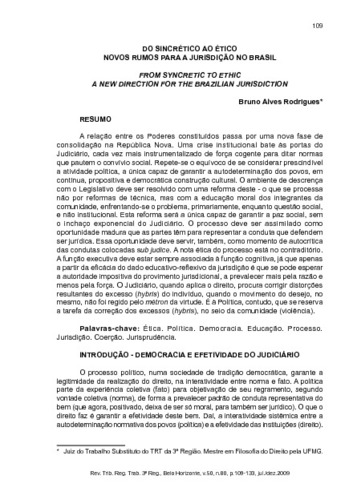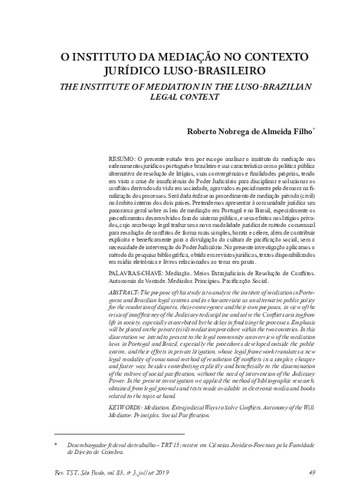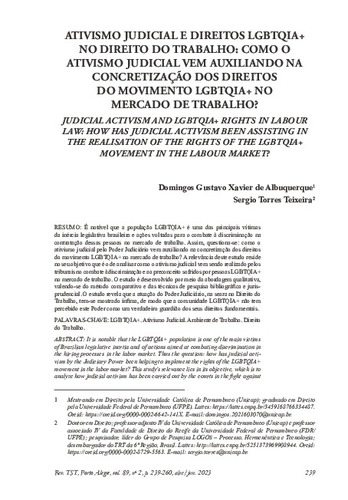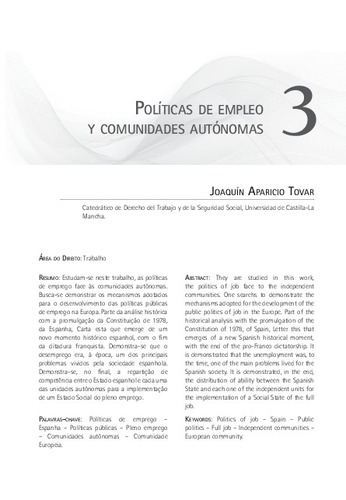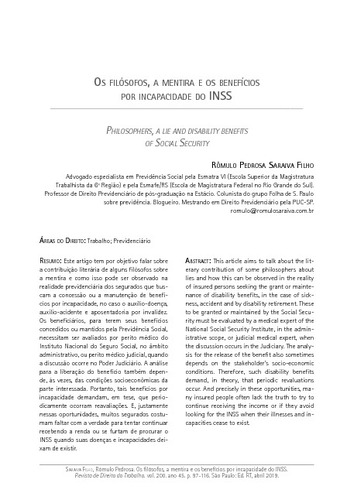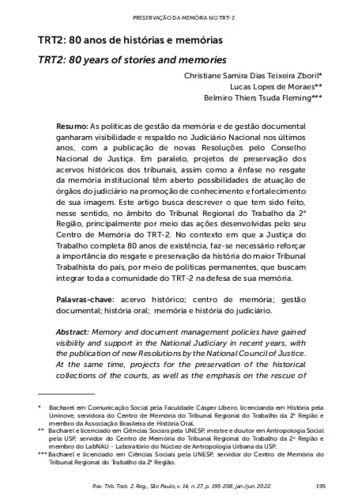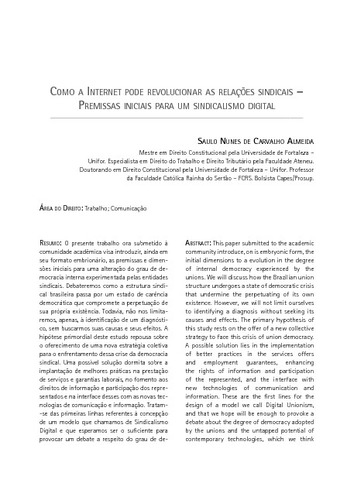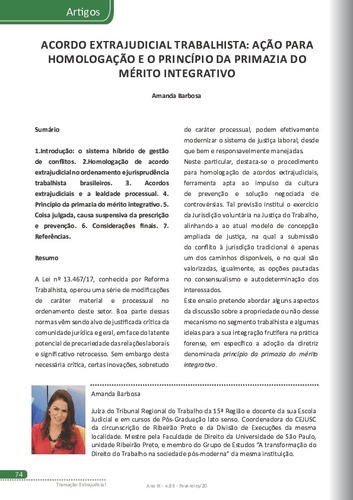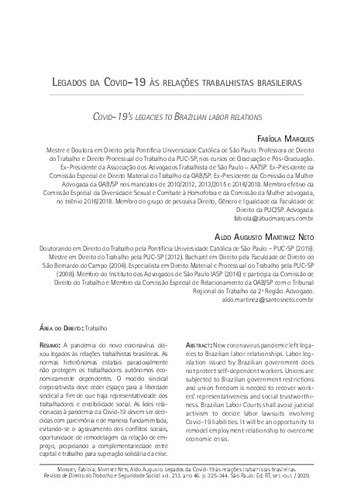Artigo de periódico
Do sincrético ao ético: novos rumos para a jurisdição no Brasil
| dc.contributor.author | Rodrigues, Bruno Alves | |
| dc.date.accessioned | 2015-12-09T14:43:37Z | |
| dc.date.available | 2015-12-09T14:43:37Z | |
| dc.date.issued | 2009-12 | |
| dc.identifier.citation | RODRIGUES, Bruno Alves. Do sincrético ao ético: novos rumos para a jurisdição no Brasil = From syncretic to ethic: a new direction for the brazilian jurisdiction. Revista do Tribunal Regional do Trabalho da 3ª Região, Belo Horizonte, v. 50, n. 80, p. 109-133, jul./dez. 2009. | pt_BR |
| dc.identifier.citation | RODRIGUES, Bruno Alves. Do sincrético ao ético: novos rumos para a jurisdição no Brasil = From syncretic to ethic: a new direction for the brazilian jurisdiction. Revista Ltr: legislação do trabalho, São Paulo, v. 75, n. 2, p. 178-189, fev. 2011. | pt_BR |
| dc.identifier.uri | https://hdl.handle.net/20.500.12178/74341 | |
| dc.description.abstract | [por] A relação entre os Poderes constituídos passa por uma nova fase de consolidação na República Nova. Uma crise institucional bate às portas do Judiciário, cada vez mais instrumentalizado de força cogente para ditar normas que pautem o convívio social. Repete-se o equívoco de se considerar prescindível a atividade política, a única capaz de garantir a autodeterminação dos povos, em contínua, propositiva e democrática construção cultural. O ambiente de descrença com o Legislativo deve ser resolvido com uma reforma deste - o que se processa não por reformas de técnica, mas com a educação moral dos integrantes da comunidade, enfrentando-se o problema, primariamente, enquanto questão social, e não institucional. Esta reforma será a única capaz de garantir a paz social, sem o inchaço exponencial do Judiciário. O processo deve ser assimilado como oportunidade madura que as partes têm para representar a conduta que defendem ser jurídica. Essa oportunidade deve servir, também, como momento de autocrítica das condutas colocadas sub judice. A nota ética do processo está no contraditório. A função executiva deve estar sempre associada à função cognitiva, já que apenas a partir da eficácia do dado educativo-reflexivo da jurisdição é que se pode esperar a autoridade impositiva do provimento jurisdicional, a prevalecer mais pela razão e menos pela força. O Judiciário, quando aplica o direito, procura corrigir distorções resultantes do excesso (hybris) do indivíduo, quando o movimento do desejo, no mesmo, não foi regido pelo métron da virtude. É à Política, contudo, que se reserva a tarefa da correção dos excessos (hybris), no seio da comunidade (violência). | pt_BR |
| dc.description.abstract | [eng] The relationship between the Brazilian's State constituted Powers is going through a new phase of consolidation. One institutional crisis reflects on the Judiciary, progressively empowered with means to dictate rules for social engagement. Again, the mistake of considering the political activity merely accessorial is made; yet, politics is still the best guaranty of people's self-determination, in a steady and democratic edification of their culture. The current disbelief on Brazilian's Legislative must be solved by its reform, which is not possible by mere technical alterations in positive law, but with the moral education of the members of the community, by comprehending that the question is social, not institutional. That reform is the only way for achieving social peace, without the increasingly swelling of the Judiciary. The process must be taken as a mature opportunity for the defendants to justify the lawfully of their bearings, shaping what would be a justiciable controversy - and also self-criticise their own behaviours, which are brought before the Court. The ethical note of the process lies on the reciprocity of the right of defence. As a result of this cognizance, by the defendants, the authority of the judgment will lie more on its reason, than on its coactive power. The Judiciary, when applying the positive law, makes an effort to correct distortions caused by the excess (hybris) on one's behaviour, when acting by his desires, without the limits of virtue's métron. But the incumbency of correcting the excesses (hybris), in a whole community, belongs to Politics. | pt_BR |
| dc.description.tableofcontents | Democracia e efetividade do judiciário -- O processo judicial ético: a essência do contraditório -- O "processo sincrético" -- Da súmula vinculante | pt_BR |
| dc.language.iso | pt_BR | pt_BR |
| dc.relation.ispartof | Revista do Tribunal Regional do Trabalho da 3ª Região: vol. 50, n. 80 (jul./dez. 2009) | pt_BR |
| dc.relation.ispartof | Revista Ltr: legislação do trabalho: vol. 75, n. 2 (fev. 2011) | pt_BR |
| dc.subject | Contraditório, Brasil | pt_BR |
| dc.subject | Tutela jurisdicional, Brasil | pt_BR |
| dc.subject | Ética social, Brasil | pt_BR |
| dc.subject | Súmula vinculante, Brasil | pt_BR |
| dc.subject | Função jurisdicional, Brasil | pt_BR |
| dc.subject | Corrupção na política, Brasil | pt_BR |
| dc.subject | Processo, Brasil | pt_BR |
| dc.title | Do sincrético ao ético: novos rumos para a jurisdição no Brasil | pt_BR |
| dc.title.alternative | From syncretic to ethic: a new direction for the brazilian jurisdiction | pt_BR |
| dc.type.genre | Artigo de periódico | pt_BR |
| dc.identifier.rvbisys | 000894735 | |
| dc.relation.ispartoflink | https://hdl.handle.net/20.500.12178/72693 | pt_BR |
| dc.relation.ispartoflink | https://hdl.handle.net/20.500.12178/104973 | pt_BR |
Coleção
-
Artigos9566


